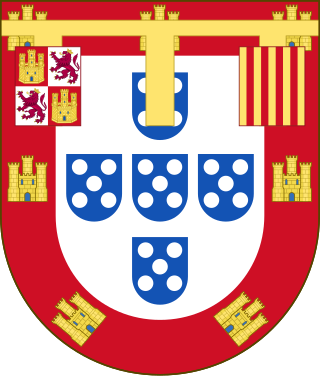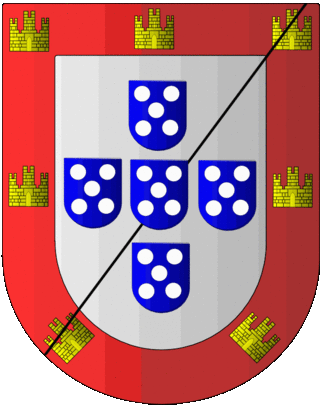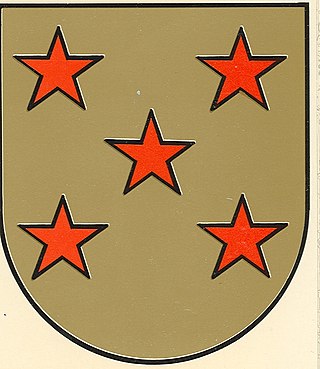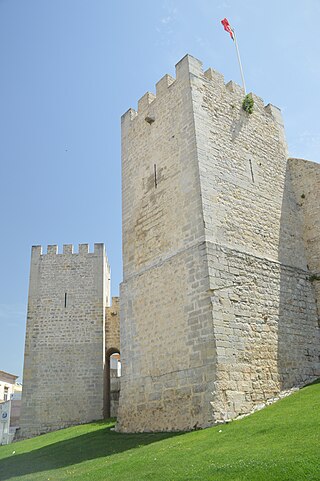
Jorge de Lencastre was a Portuguese prince, illegitimate son of King John II of Portugal and Ana de Mendonça, a lady-in-waiting to Joanna la Beltraneja. He was created the second Duke of Coimbra in 1509. He was also master of the Order of Santiago and administrator of the Order of Aviz from 1492 to 1550.

Ferdinand of Portugal, Duke of Guarda was a Portuguese infante (prince), the son of King Manuel I of Portugal and his second wife, Maria of Aragon.
The highest hereditary title in the Portuguese nobility. By tradition, there are a total of five royal and seven non-royal dukes in Portugal, out of 28 dukedoms that have ever been created. In the majority of cases, the title of duke was attributed to members of the high nobility, usually relatives of the Portuguese royal family, such as the second son of a monarch.

Count of Cantanhede was a Portuguese title of nobility created by a royal decree, dated from 6 August 1479, by King Afonso V of Portugal, and granted to D. Pedro de Menezes, 5th Lord of Cantanhede.
Hugo José Jorge O'Neill was the head of the O'Neill Clandeboy dynasty, which ruled a kingdom in Gaelic Ireland until the early 17th century, and has been in Portugal since the 18th century.

The title of Duke of Guarda was granted by a royal decree dated from October 5, 1530, by King John III to his younger brother, Infante Ferdinand.

João de Lencastre, was the older son of Jorge de Lencastre, Duke of Coimbra and of his wife Dona Beatriz of Vilhena.

Count of Valença was a Portuguese title of nobility, created by a royal decree, dated from July 20, 1464, by King Afonso V of Portugal, and granted to Dom Henrique de Menezes, who was already 3rd Count of Viana and 4th Count of Viana.
Count of Abrantes was a Portuguese title of nobility created by a royal decree, dated from June 13, 1476, by King Afonso V of Portugal, and granted to his 4th cousin, Lopo de Almeida.

Count of Viana (do Alentejo) was a Portuguese title of nobility granted to D. João Afonso Telo, who was the second son of João Afonso Telo, 4th Count of Barcelos and a cousin of Queen Leonor Teles, by King Ferdinand I of Portugal pursuant to a royal decree dated 19 March 1373.

Count of Loulé was a Portuguese title of nobility granted to Henrique de Menezes by royal decree issued on November 12, 1471, by King Afonso V of Portugal.
Coutinho is a noble Portuguese language surname. It is a diminutive of Couto. It is from Late Latin cautum, from the past participle of cavere ‘to make safe.' It may refer to:
Vasco Fernades Coutinho was a distinguished Portuguese nobleman, the 3rd Marshal of Portugal and 1st Count of Marialva.
The office of Marshal of the Kingdom of Portugal was created by King Ferdinand I of Portugal in 1382, in the course of the reorganization of the higher offices of the army of the Kingdom of Portugal. The Marshal was directly subordinate to the Constable of Portugal (Condestável), being principally responsible for the high administrative matters, including the quartering of troops, supplies and other logistical matters.
Vasco Fernandes Coutinho may refer to:

Gonçalo Vasques Coutinho (1360s–1410s) was a Portuguese nobleman, 2nd Marshal of Portugal, who served as alcaide-mór of Trancoso and Lamego.

Francisco Coutinho (1465-1532) Count of Marialva and Loulé, was a Portuguese nobleman, who served to the Portuguese monarchy, during the reign of John II.

Gonçalo Coutinho was a Portuguese nobleman, Count of Marialva. and Constable of Portugal.

Brites or Beatriz de Meneses (c.1470-1530) Countess of Loulé and Marialva, was a Portuguese noblewoman, granddaughter of Fernando I, Duke of Braganza.










